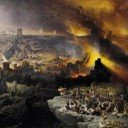In this post we will deal with the incerdibly difficult and controversial passage found Ezekiel 38 and 39. This passage describes a great battle that many have argued is a prediction of the Battle of Armageddon. This is despite the fact that Armageddon is mentioned in the middle of Revelation and the major figures of Ezekiel 38 and 39 do not appear until the end of the Millennium.
And that’s just the beginning of the confusion!
Add to it a very “ancient” battle description with horses, wooden instruments of war, nations and tribes that no longer exist and a use of etymology by some that causes more confusion than even the difficult text itself. We will first deal with the issues of language and then discuss the timing of this event and whether it is necessary to put this event some time into our future. We will then discuss this picture and how it relates to the book of Revelation.
GRAMMATICAL GYMNASTICS
There is a very large group of prophecy experts who have over the years espoused and promoted the idea that the names used for those nations or individuals are related to current nations that will supposedly lead a multi-national conglomerate of nations preparing to attack Israel. Those names are Rosh, Meshech and Tubal. According to those promoting this view these names represent current nations or cities, primarily located in modern day Russia.
Rosh = Russia
Meshech = Moscow
Tubal = Tobolsk
Is this a valid interpretive method? I would love to answer with a simple and obvious “no,” but the popularity of this view demands some sort of response. First, let us deal with Rosh.
ROSH
Rosh literally means “prince,” “chief” or “leader.” Despite the interpretation of the New American Standard Bible translating the word of “prince of Rosh.” This is simply a wrong translation and no other major translation shares this translation method. This is another case of the unfortunate Dispensational interpretive bias amongst the translators of the NASB. Even ardent futurist have criticized this translation, including Charles Ryrie.
The term Rosh in Hebrew means chief or leader is a Hebrew word. Russia comes from the 11th century Scandanavian word “Rus” and has no relation in root and etemology to the word “rosh.” It’s beyond a stretch of all credulity. The two other nation names do not help the futurist either as we will see.
MESHECH AND TUBAL
This is quite simple. Meshach and Tubal were actual city/nations before the time of Christ and were part of the larger Persian Empire. These words come from the Asiatic words Mushka and Tabal and they are both literal locations located in modern day Turkey and, again, have NO relation to the nation of Russia in any way. This is such poor exegesis and now many modern Dispensationalist have abandoned these claims, though the more popular prophecy experts still promote it.
Now, let us consider the actual battle and whether this is a battle that can or should be placed into the future.





No comments:
Post a Comment